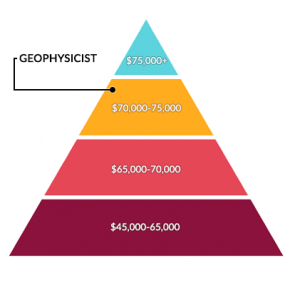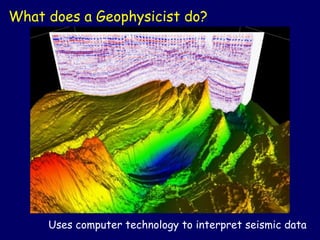All Categories
Featured
Table of Contents
Marine Geophysicist in Port Kennedy Oz 2023
This work is progressively contracted out, so consultancies supply another source of work. Consultancy firms differ in size, from extremely small companies to large multinationals. Some consultancies are rather specialised in using particular geophysical methods or working in particular areas, while others offer a more diverse variety of services to their customers.
The extraction of gas from land fill websites is another location of work and this might grow in the future. Exploration business may undertake work for building and construction firms, public utility, mining business and ecological firms, so geophysicists might be used in any of these settings. Other companies consist of: geological surveysgovernment bodies and agenciesuniversities and research study institutes.


Vacancies may be noted in the oil and gas sector press. Recruitment is affected by oil cost changes and the level of competitors for positions differs depending upon this. Careers Days, which cover the full series of geoscience careers and are usually attended by a number of essential market employers, are run by The Geological Society.
Exploration Geophysicist: Occupations In Alberta in Martin WA 2020
Some of the large oil and gas business provide a complete two-year structured training programme across the breadth of geophysics, including the chance to experience work in various teams prior to specialising in one location. Your training might consist of deal with: existing wellsmagnetic and gravitational prospective field data analysisresearchrock analysis. However, it's more usual for your preliminary training to be provided on the job.

There might be a probationary duration throughout which you work together with a knowledgeable colleague. Competency-based appraisals happen frequently in most companies. In smaller sized companies, and for academic posts, there is unlikely to be any official training - you'll be expected to start work straightaway and pick up skills as you go along.
If you work for a smaller company, you may find that you need to take obligation for setting up and funding your own development and training. If you have a geology degree, membership of The Geological Society can be useful for networking and for keeping up to date with the industry.
Geophysical Methods in Riverton Oz 2022
You may also discover it beneficial to sign up with the PESGB (The Petroleum Exploration Society of Great Britain, which has a geophysics special interest group. After a probationary period, and as soon as you have actually gained some experience, you might advance to senior geophysicist, then group leader and then into a senior role in management.
The ease of motion between functions depends upon the business structure. Study at Masters or Ph, D level in a subject related to geophysics or geosciences may aid with your profession advancement and development. The employment market within the oil and gas industry is really based on cost and this may affect your opportunities for profession progression.
For experienced geophysicists, freelance consultancy uses a great route for profession advancement. As a geophysicist, you're most likely to have a number of tasks throughout your working life.
Geophysical Surveying in Duncraig Oz 2020
From geophysics, it's possible to focus on seismology (completing further training to become a seismic interpreter) or to move into associated locations such as engineering geology or hazard forecast.
Choosing what to study in college is a tough option. Even if you know that your field of interest depends on science, what program of study is best for you? If you make the choice to significant in physical and life sciences and pursue a profession as a geophysicist, you're preparing for an amazing and profitable occupation.
But the very first action to achieving your goal of ending up being a geophysicist is making a degree. Even for entry-level positions in the field of geoscience, you'll need a bachelor's degree (a geophysicist college degree) from a certified college or university. Some research positions need candidates to hold master's degrees and even Ph.
5 Surface Geophysics in Waterford Aus 2022
Doctoral degrees are specifically crucial if you plan to teach at a four-year institution. Geophysicists apply physics principles and strategies to study the gravitational, magnetic, and electric fields of the earth. This advances scientists' knowledge of both the planet's interior core and its surface area. Geophysicists must have the ability to: examine rocks, pictures, and other pieces of data conduct research both in the field and in laboratories produce maps and charts of their findings compose reports To accomplish all this, students need a specialized education for geophysicist careers.
As mentioned above, you'll need a bachelor's degree in geoscience or an associated discipline, such as a physical science or a natural science, to land an entry-level task. Students can likewise prepare by majoring in subjects like: Biology Chemistry Computer science Engineering Mathematics Physics The above geophysicist majors provide a more generalized approach to a single clinical discipline, but most programs need students to take one or more geology course.
Latest Posts
Geoscientist - College Of Science in St James Aus 2021
What Is A Seismic Survey? in Straffon Oz 2021
What Are Geological, Geochemical, in Hovea WA 2022